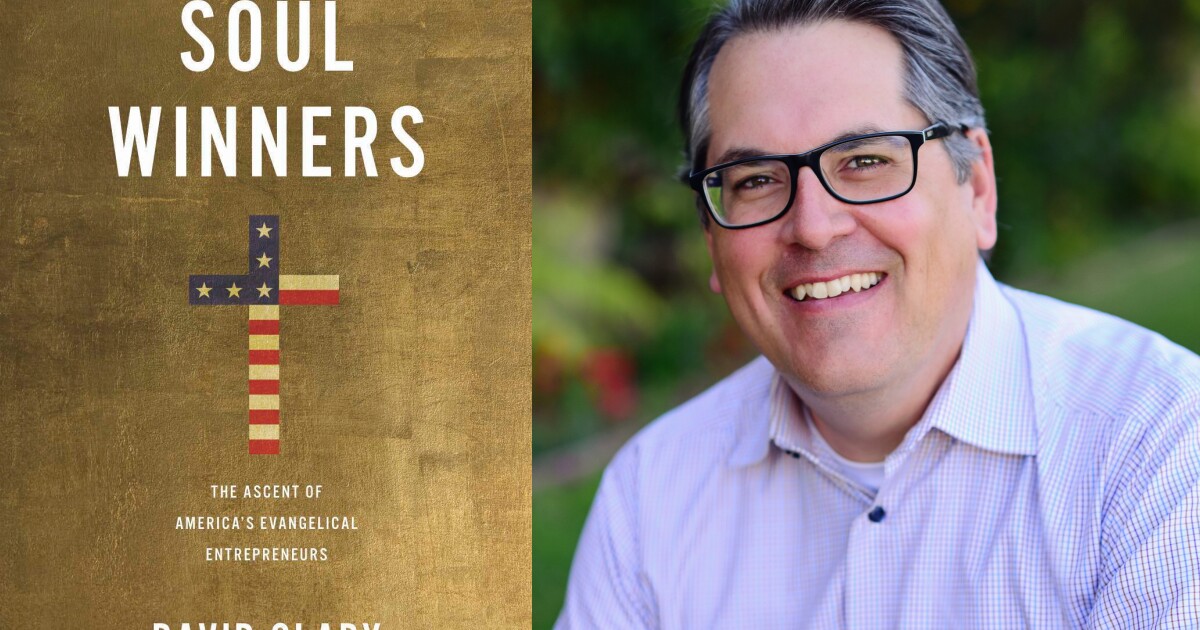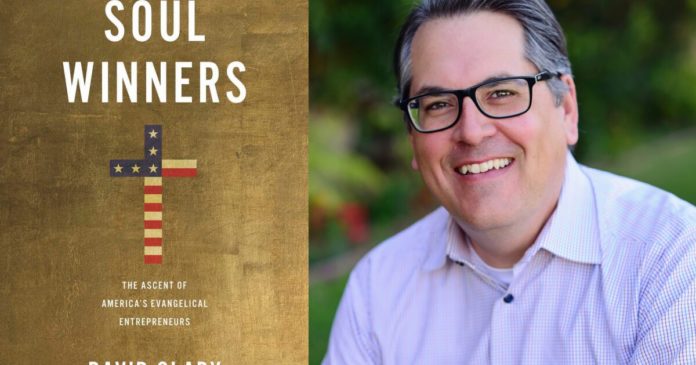
Every few years, the majority of the U.S. population again has to reckon with Christian evangelicalism. Whether it’s an election cycle or an issue of equality — for example, gay marriage or, more recently, abortion — the vast majority of Americans who are not affiliated with evangelicalism don’t seem to make half as much noise, politically or socially, as the 62 million, according to the Pew Research Center, who consider themselves part of that faith.
And while it would be easy to believe that this has everything to do with their strict and strident interpretation of the Bible, it might actually have more to do with other factors. Sure, a lot of evangelicals will point to sermons and various verses to substantiate a certain belief, but in truth, it might have more to do with a deeply felt devotion to capitalism and individualism than religion.
This is one of the many interesting insights in David Clary’s “Soul Winners: The Ascent of America’s Evangelical Entrepreneurs,” a deeply researched but decidedly readable history of evangelicalism in the United States. Rather than focus on the spiritual tenets of the myriad faiths that make up evangelicalism, the book is told through the lens of the pro-business, pro-capitalism ethos perpetuated by the (mostly) men who have been at the center of the movement since the 18th century.
For Clary, the lightbulb moment came when he discovered that, while there were plenty of books devoted to the history and politics of evangelicalism, there weren’t any that fully examined the business acumen of these faiths. It may sound fringe on the surface, but this is important when readers consider, as Clary points out early in the book, that the two largest evangelical churches were actually founded not solely on faith, but on the principles of “market research and management principles.”
“I felt like looking at evangelicals as entrepreneurs and their business-oriented philosophy was underplayed,” says Clary, who, full disclosure, works as a news editor for The San Diego Union-Tribune. “The more I dug into the history of some of these figures, and the history of the theology that’s embedded in evangelicalism, it became more and more clear to me I was able to connect so many more dots.”
“I’ve always been interested in why people believe in what they believe in and the consequences that those religious beliefs have in the public arena,” Clary continues.
Entrepreneurial mindset
Before fully exploring the origins of American evangelicalism, Clary begins his book with the COVID-19 pandemic, arguing that many evangelicals’ anti-vaccine, anti-lockdown stances can actually be traced back to the movement’s individualistic, anti-government origins.
“We certainly saw that during the pandemic, with churches staying open despite government calls that they close,” Clary points out. “And you see evangelical resistance with vaccine mandates and mask mandates — it ties into their entrepreneur spirit. They’re not used to being told what to do and when they are told what to do, they can often resist it.”
Connecting those dots included laying out evangelicalism’s colonial origins in the 1730s, which was spearheaded by George Whitefield breaking away from the Anglican church to lead the First Great Awakening. By doing this, Clary is able to show readers the spiritual roots of what he calls the “prosperity gospel,” which in present-day circumstances is most clearly evident in the megachurches led by people like Joel Osteen and John Gray. In between, Clary deftly pinpoints throughlines and similarities in the ways in which evangelicals have harnessed free-market capitalism, and even the Constitution itself, to spread their message and grow their influence.
“America was the first country that was founded without an official religion, an established faith. And that was revolutionary,” Clary says. “It really opened the way for entrepreneurs because there was not an official church. And so the church really had to rise or fall on their own skills at reaching people, and in packaging a message and getting it out there. They couldn’t just rely on government support to build their congregation. So really from the start, the United States was a perfect incubator for the evangelical entrepreneurial mindset.”
Because of this, Clary argues that “individualism, mistrust of government, and faith in capitalism” are “deeply ingrained” in evangelicalism. This is most presently evident in current issues such as masking and vaccination mandates during the COVID-19 pandemic, as well as the faith’s opposition to legislation such as the Affordable Care Act.
Political force
Some of the more interesting chapters in “Soul Winners” deal in how evangelicals, despite their aversion to government, became such a political force in the late 1970s and ’80s. They’d always held deeply conservative beliefs on social issues, but the emphasis had always been on “business over labor” and favoring “free-market ideals over public welfare.” But with the prosperity gospel at full power thanks to televangelists, and untaxed money flowing in from followers, Clary argues that evangelicals began to flex their political influence.
“But it was the ‘rights’ movements for gay people, women and Blacks that lit the fuse for the evangelical shift to partisan engagement,” Clary points out in the book. “Liberal court rulings and the social upheavals of the 1960s and 1970s undermined what evangelicals understood to be America’s Christian-based values.”
“There’s a throughline going back more than a century with evangelical involvement in politics and certainly business,” says Clary, who names the book after a quote from the Rev. Jerry Falwell. “I just think it became more overt, at least the political side became more overt, in the late ’70s when you started seeing the rise of people like Falwell. The Moral Majority started in the Reagan era. After that, the Christian Coalition in the 1990s and Pat Robertson running for president in 1988.”
Clary brings an objective journalistic approach to his research and writing. Evangelicalism’s various sects and offshoots, as well as its subsequent movements, are all fairly portrayed, with Clary letting the facts speak for themselves. He sees the book as appealing to anyone with an interest in the history of religion and business in the United States. In the case of “Soul Winners,” it’s that rare book that adeptly lays out how laissez faire economic systems and religious fervor are often symbiotic, with both thriving because of the other.
“I didn’t want to write a history of evangelicalism. I wanted to try to focus on the people that best exemplified this idea of being entrepreneurs and being business-focused,” says Clary, who attended various evangelical church services himself to get a better understanding of congregants and leaders.
“The characters are fascinating,” Clary says. “I just loved doing the research and talking to some of these people. I loved doing the work, and it was really enjoyable.”
“Soul Winners: The Ascent of America’s Evangelical Entrepreneurs” by David Clary (Prometheus, 2022; 290 pages)
Warwick’s presents David Clary
When: 7:30 p.m. Wednesday, Sept. 14
Where: Warwick’s, 7812 Girard Ave., La Jolla
Tickets: Free
Online: warwicks.com
Combs is a freelance writer.








